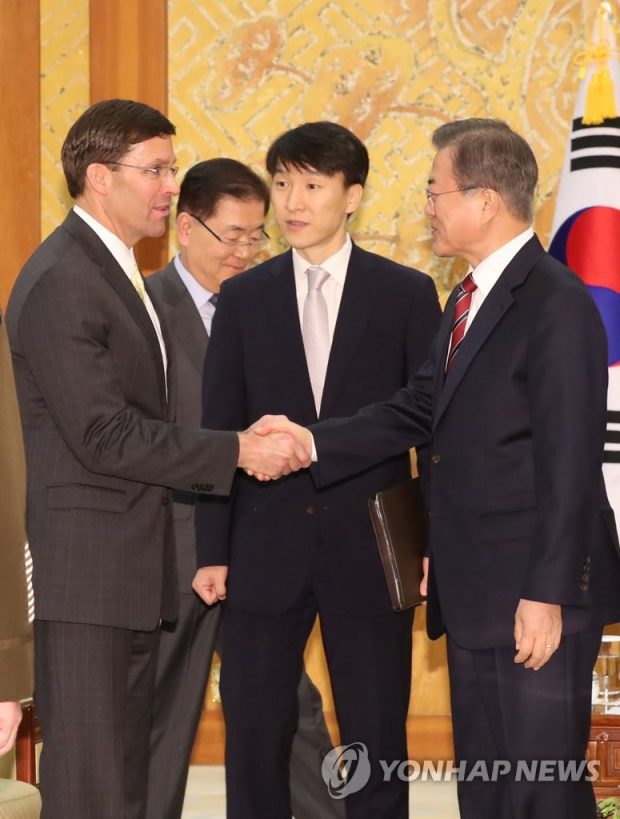Esper says U.S. will seek Japan’s efforts to resolve GSOMIA issue: Cheong Wa Dae

President Moon Jae-in (R) shakes hands with U.S. Secretary of Defense Mark Esper (L) at a Cheong Wa Dae meeting on Nov. 15, 2019. (Yonhap)
Seoul: U.S. Defense Secretary Mark Esper told South Korean President Moon Jae-in on Friday he will try to persuade Japan to “smoothly” resolve the dispute over the two neighbors’ military information-sharing arrangement, according to the presidential office.
During a 50-minute meeting with Esper at Cheong Wa Dae, Moon explained his government’s basic position that it’s “difficult to share military information” with Japan, which has imposed export restrictions against South Korea for a stated reason that Seoul is not trustworthy as a security partner, Cheong Wa Dae spokesperson Ko Min-jung said.
In late August, the Moon administration decided not to renew the General Security of Military Agreement (GSOMIA) and it’s slated to expire as of next Saturday.
The president, however, reaffirmed his administration’s commitment to continued efforts for “important” trilateral security partnerships in regional security.
The Pentagon chief was quoted as telling that he will ask Japan to make efforts as well to resolve the GSOMIA issue smoothly.
Moon gave a positive assessment of Esper’s remarks on the future of the allies’ combined military drills.
On his way to Seoul, Esper told reporters, “We will adjust our exercise posture either more or less depending on what diplomacy may require.”
It apparently indicates Washington’s openness to scaling back regular joint exercises with Seoul in a bid to keep the door open for denuclearization talks with Pyongyang.
North Korean officials were quick in responding positively to his statement, raising the likelihood of the two sides restarting nuclear bargaining in December.
After holding an annual Security Consultative Meeting (SCM) session with South Korean Defense Minister Jeong Kyeong-doo earlier Friday, Esper confirmed a plan to adjust such military practices.
“President Moon and Secretary Esper exchanged views on related matters, including North Korea’s response,” Ko said.
In the post-SCM press conference, the secretary emphasized that keeping GSOMIA alive is crucial in three-way security cooperation, especially against China and North Korea.
Its expiration, attributable to “continued friction between Seoul and Tokyo,” would be of benefit only to Pyongyang and Beijing, he said.
He also pressed South Korea to pay more for American troops on its soil.
“(South) Korea is a wealthy country, and could and should pay more to offset the cost of defense,” he said.
Seoul and Washington are haggling over sharing the cost of the presence of the 28,500-strong U.S. Forces Korea.
Ko, however, said the money issue was not raised in the Moon-Esper meeting, originally scheduled to last half an hour.
The other U.S. attendees were Gen. Mark Milley, the chairman of the U.S. Joint Chiefs of Staff, U.S. Forces Korea (USFK) commander Gen. Robert Abrams, Ambassador Harry Harris and Randall Schriver, assistant secretary of defense for Indo-Pacific security affairs.
It was joined by several South Korean officials, as well, including the defense minister, Joint Chiefs of Staff Chairman Gen. Park Han-ki, Chung Eui-yong, head of Cheong Wa Dae’s National Security Office (NSO), and Kim You-geun, deputy director of the NSO.
YONHAP























































